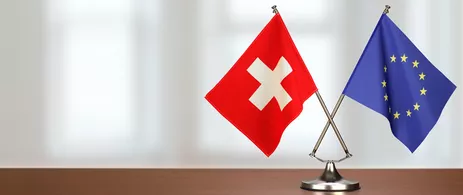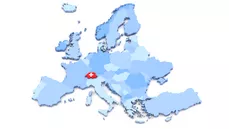
The EU and Switzerland have traditionally had a complicated relationship. For the good of science, however, the two parties should do everything they can to achieve a happy ending, believes TUM Brussels liaison officer Valerie Schegk. After all, research and scientific progress know no national borders and should therefore not be made dependent on political positions.
Switzerland is located in the middle of the European continent, but is not part of the European Union. And that is out of its own conviction. In several referenda since 1992, the Swiss have always voted against membership in the EU. This has mainly political reasons, e.g. independence from the European conglomerate of 27 different nation states and their different situations. But when it comes to research and innovation, things get more complicated.

A conflict with tradition
The EU is Switzerland's most important trading partner, while the Alpine republic is the EU's fourth largest trading partner. More than 100 bilateral agreements govern cooperation between the two parties To end this patchwork of agreements, Brussels and Bern have spent the past 13 years negotiating an institutional framework agreement that bundles the most important of these arrangements and aims to ensure that Switzerland accepts the rules of the EU's single market.
In May 2021, the Swiss government left the negotiating table over concerns about migration and labor rights, as well as the powers the framework agreement would give the European Court of Justice. The EU, on the other hand, insists that the framework agreement must first be signed before new individual bilateral agreements can be reached. For those of us who have been active in the EU policy scene for some time, this comes as no surprise, but feels more like déjà vu.
Back in 2014, Switzerland was excluded from the Horizon 2020 research funding program. At the time, the Swiss population narrowly supported a referendum that had as its goal the restriction of immigration from neighboring EU countries. This was a clear violation of the EU principle of free movement of persons. As a result, Swiss scientists were excluded from the EU research competition between 2014 and 2016, a painful and expensive experience in retrospect of how science can become a victim of politics. The result was a sharp decline in European research projects coordinated by Swiss institutions.
Status quo: negotiations at an impasse
ETH Zurich, EPFL Lausanne, and more: Switzerland is home to some of Europe's best universities and Swiss institutions have traditionally been very successful in competing for ERC proposals. However, since the negotiations are still at an impasse, Switzerland is currently not associated to Horizon Europe and Swiss research institutions cannot receive EU funding. This results in the absurd situation that the selected Swiss ERC applicants in 2021 – 28 in total – will have to look for a new host institution in one of the EU member states.
Some institutions are already preparing a talent scouting campaign for these "homeless" ERC grant winners. Can we expect a kind of soccer transfer system for highly talented researchers in the future? This may be an exaggeration, but the political instrumentalization of research is a reality.

Switzerland has long contributed to the excellence of the European Research Area (ERA). It is a founding member of the European Space Agency and, together with France, hosts the European Organization for Nuclear Research (CERN).
So we have to ask ourselves: can we really imagine excellent European research competition without the participation of Swiss institutions? But also the other way around: Isn't EU research funding also extremely attractive for Swiss universities, as it enables networks, attracts talent and is associated with prestigious prizes, in addition to financial benefits?
Stick to science: Can research be completely detached from politics?
Let's stick to science! Is this an attitude that does justice to the complex reality of European (research funding) structures? The European Union, which in this case is the funding agency, is a very political construct. It was created to help Europe grow from a post-war to an economically competitive continent.
Since its beginnings, the EU has changed enormously: away from a pure economic union to a union of values with a common currency. Peacemaking and diplomacy are at the heart of the European Union, and the partnership goes much deeper and covers a broader field than in its early days. Combining this with the promotion of research and innovation creates fertile ground for conflict. We see that Horizon Europe is not only shaped by the idea of excellence, but also by political motives. This is the only way to explain why Switzerland is currently not associated, but other countries with far less research and innovation capacity are.
Of course, European research funding is subject to conditions. The European Commission makes it very clear that European taxpayers' money should also be spent for their benefit. This is manifested in the implementation logic of the very impact-oriented Horizon Europe program, of political priorities and key strategic orientations that should lead to concrete results in research. Consequently, it is precisely these political priorities of the Commission that must be integrated into the EU application in order to be successful in the end.
Conclusion: Can we expect a quick solution?
The question now is: Can we expect a quick solution? The scientific world has a unified answer: we must. The price is too high, because otherwise excellent research and research collaboration and, in a next step, innovation in Europe will suffer a lot from this blockade situation. As the UK is currently in a similar situation to Switzerland – even if a solution seems easier to achieve there – Europe is in danger of losing proven and long-standing partners in scientific excellence.

Many stakeholders, such as the Federation of German Industries, are calling on both sides to resume constructive talks quickly. Otherwise, they fear profound consequences for entire industries, such as medical devices. Overall, the economic momentum of the entire European region will be jeopardized.
TUM has long-standing relationships with Swiss partners such as ETH and EPFL. The latter is a partner in the EuroTech Universities Alliance. TUM President Thomas F. Hofmann has repeatedly advocated for Switzerland and urged the European Commission to finalize Switzerland's association as soon as possible. As this decision is embedded in the broader discussions on future relations between the EU and Switzerland, quick successes cannot be taken for granted. In the end, one can only hope for the common sense of all parties to return to the negotiating table sooner rather than later.
Sources:
BDI: Restructuring our partnership with Switzerland
Euractiv: Swiss scrap talks with EU on cooperation deal
Euractiv: Worlds apart: Switzerland and EU keep talking past each other
EuroTech Presidents express concern over excluding associated countries
Swiss State Secretariat for Education, Research and Innovation
Science Business: Switzerland’s exile from EU research is a cautionary tale for the UK
Swissinfo: Why is Horizon Europe important for Switzerland and the European Union?